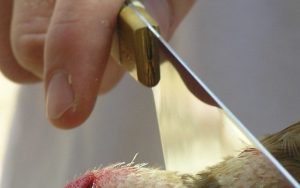By Eddy Wax – www.politico.eu
Flanders will test the limits of European law on animal welfare and religious freedom.
 It is the last year that Mohamed Bouezmarni can help sacrifice around 200 sheep in a southern Belgian slaughterhouse for the Muslim festival of Eid al-Adha.
It is the last year that Mohamed Bouezmarni can help sacrifice around 200 sheep in a southern Belgian slaughterhouse for the Muslim festival of Eid al-Adha.
From September 1, the French-speaking region of Wallonia will be the second Belgian authority after Flanders to ban halal and kosher slaughter as it moves to prohibit killing animals without prior stunning. The bans are the result of a long push by animal welfare activists, but Jewish and Muslim groups fear they are also a sign that the anti-immigrant sentiment of right-wing Flemish nationalists has captured Belgium’s political mainstream.
Lamenting this impending legal obstacle to a festival that he describes as “the equivalent of Christmas,” Bouezmarni, the head of the Muslim association in the town of Arlon, feared that sacrifices could be driven underground.
“Everyone will do it at home, or in some corner, hidden from view. I think that’s not [the animal activists’] aim,” he said.
While traditional slaughter without stunning has already been banned in EU countries such as Sweden, Denmark and Slovenia, Belgium is turning into a critical test case of where the line lies in European law between animal welfare and religious freedom. Belgium’s Constitutional Court has called on the European Court of Justice to issue a judgment on the ban in Dutch-speaking Flanders, which was introduced on January 1.
“I think that the anti religious slaughter bills are much more to do with two-legged animals, than four-legged animals” — Pinchas Goldschmidt, president of the Conference of European Rabbis
That court ruling should come within the next two years and set a precedent for the whole of Europe.
A matter of life and death
When the Walloon and Flemish parliaments voted for the bans almost unanimously in 2017, it was a huge victory for GAIA, Belgium’s animal welfare lobby which styles itself as “the voice of the voiceless.”
Its president, Michel Vandenbosch, has campaigned against religious slaughter for over 20 years. “You can’t let, in a modern secular society, religion decide,” he said. “If it can be prevented, it should be prevented.”
This debate, though, has not always been exclusively about animal welfare. For some, there is a sense that far-right politicians in Flanders used animal suffering as a Trojan horse to push a populist anti-Muslim agenda.
Six members of Flemish far-right party Vlaams Belang, including its President Tom Van Grieken, made a parliamentary proposal to ban religious slaughter in May 2015.
A representative of Belgium’s Collective Against Islamophobia (CCIB) said: “In the past it was only a party like the Vlaams Belang that called for the banning of slaughter … the vocabulary, the discourse, or the ideology of Vlaams Belang has … become popularized in Flanders, through the N-VA.” The right-wing New Flemish Alliance (N-VA) oversaw the introduction of the ban.
In a 2018 report, the independent research center CRISP in Belgium found that for a considerable number of politicians and members of the broader public, the concept of ritual slaughter was limited to the annual Eid al-Adha, festival of sacrifice. The report states: “In a context of increasing hostility to Islam, the extreme right has seized on this issue, and willingly used shocking images to convince the public of the ‘savagery of this foreign-imported custom’.”
GAIA’s Vandenbosch accepted that, in the past, the debate around ritual slaughter “was something you didn’t talk about because it had this unpleasant smell, because … it’s a bit racist.” But he said the issue was now viewed differently. “We took this out of the hands of the extreme right.”
Pinchas Goldschmidt, the president of the Conference of European Rabbis, disagreed, stating that the Muslim community was being targeted, with Jews left as the “collateral damage.”
“I think that the anti [religious slaughter] bills are much more to do with two-legged animals, than four-legged animals,” he quipped.
Despite launching separate legal challenges, Belgian Muslims and Jews feel like they are in the same boat.
“If there is one positive thing that happened from these new attempts to curtail religious freedom it is bringing the Jewish and Muslim communities closer together,” Goldschmidt said. Imams and rabbis launched the Muslim Jewish Leadership Council in Vienna in 2016 to campaign on issues of religious freedom across Europe together.
Cultural schism
The gulf between animal rights activists and religious communities, however, could hardly be more stark.
Wallonia’s Animal Welfare Minister Carlo Di Antonio played down the idea that the laws posed an insuperable problem for religious practice. “The Walloon decree was finalized in such a way as to respect freedom of religion,” he wrote to POLITICO.
Albert Guigui, the chief rabbi of Brussels, said that the reversible stunning satisfies one current of Islam but stunning, whether reversible or not, is banned for Jews | Laurie Dieffembacq/AFP via Getty Images
A clause in the law states that when religious slaughter takes place non-lethal stunning, also known as reversible stunning, should be used — leading the government to argue the ban does not limit religious freedom. Depending on their cultural background, this is true for some Muslims who can sometimes accept limited forms of stunning, as long as it can wear off. However, it is out of the question for Jews, who have zero tolerance for stunning of any kind.
Albert Guigui, the chief rabbi of Brussels, said: “The legislators have put in the law [that] the stunning must be reversible, which means they are satisfying one current of Islam. But for us whether it’s reversible or not, it’s banned.”
Vandenbosch from GAIA was hostile to such thinking.
“With Kashrut [the laws governing food in Judaism], you have scholars who are fundamentalists, a total unwillingness to evolve,” he said. “That’s a problem in a secular society … It is like we are from two different planets, we are from Earth and they are from Mars or Jupiter,” he said.
Yohan Benizri, a lawyer fighting the case for the Belgian Federation of Jewish Organizations (CCOJB), condemned that view for singling out Jews and implying that Jews are “not smart enough to realize that they need to change their ways.”
Former Flemish Parliament lawmaker and ex-Green Hermes Sanctorum, the first lawmaker to propose a ban on slaughter without stunning, believed the law has already made a positive impact in his region.
“I think that animal suffering is reduced in a fundamental way.”
But that did not mean the work was over. “Does it mean there is no animal suffering anymore on a large scale? No, of course not. If you divide a million by two you still have 500,000,” said Sanctorum.
This article is part of POLITICO’s premium policy service: Pro Agriculture and Food. From food safety to animal disease, pesticides and more, our specialised journalists keep you on top of the topics driving the agriculture policy agenda. Email pro@politico.eu for a complimentary trial.



